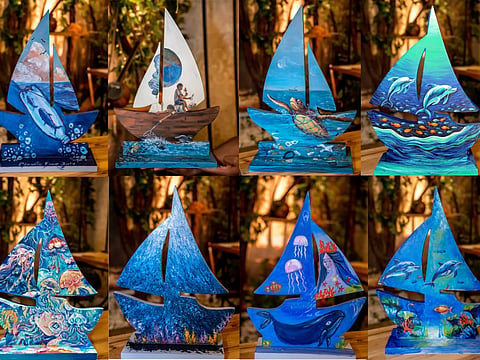Watch: UAE’s iconic dhow turns canvas to fight plastic pollution in oceans
Mini dhows transformed into eco art to portray ocean plastic crisis in Plastic Free July

The “Brushes for the Blue – Live Art for Life Below Water” by Art4you Gallery turned the spotlight on marine conservation and the global crisis of plastic pollution, as part of the Plastic Free July movement.
Held at Mehromah Art House in Jumeirah, the event, led by curator Jesno Jackson, reimagined the dhow not merely as a cultural icon but as a medium of ecological storytelling. Artists painted directly onto boat-shaped wooden panels inspired by the traditional fishing dhows of the region, evoking a deep emotional and historical connection to the sea.
“These aren’t just dhows,” said Jesno, who made the dhow-shaped reusable wooden panels. “They are voices from the ocean, urging us to protect the blue heart of our planet.”
Aligned with the Plastic Free July campaign and the UN’s Sustainable Development Goal 14 (Life Below Water), the event called for urgent action through creative expression.
The dhow panels were brought to life with powerful marine imagery, from joyful dolphins and vibrant corals to sea creatures trapped in plastic. Each brushstroke became a statement on biodiversity, loss, and responsibility.
Trapped in plastic
Artist Jeevan Oroolu Veettil created a haunting image of a fish trapped in plastic, symbolising the silent suffering caused by human neglect.
Parisa Keramati merged science with art, drawing from her research on removing toxins like mercury from water.
Nithin Umesh’s “Voice for the Voiceless” honoured marine life that cannot speak for themselves, while Fatimeh Habibollah invited viewers to emotionally connect with the ocean’s fragile grace.
Roya Vahidi captured dolphins dancing through colorful reefs, hinting at the silent plea for protection beneath the surface. Thomas Antony imagined children cleaning polluted waters, embodying a vision of hope and responsibility.
Jaimee Felysee’s “Silent Beauty” paid tribute to misunderstood marine creatures like jellyfish, while Natallia Venerova used her art to advocate for SDG 14.
Urgency to save marine life
From Reem Al Subiae’s mystical mermaid holding the globe, to Jesno Jackson’s own marine-themed piece warning of plastic danger, to textured coral art by Avigyan Bhattacharya and paradise-seascapes by Dahana Salem, each work amplified the urgency to protect marine life.
Mana Razeghi’s marine characters blended myth with realism to call for greater respect for life beneath the waves. Naseem Abdo Othman’s joyful dolphins celebrated marine vitality, whileKumar Chadayamangalam reflected deeply on his emotional bond with the ocean, saying, “It felt like I was painting for the ocean itself.”
Noreen Nawab’s self-portrait merged with sea life and stood as a powerful reminder of humanity’s intrinsic link to the ocean.
Stark portrayals of contrast
“The artworks showcased vivid scenes of underwater worlds: vibrant corals, joyful dolphins, graceful sea turtles, and flourishing fish. Yet alongside these uplifting images were stark portrayals of environmental harm, tangled marine animals, floating plastic debris, and damaged habitats. This deliberate contrast invited reflection and urged action,” said Jesno.
Art4you Gallery’s CEO, Rengi Cherian, said: “We ae committed to being a visual force for ocean awareness. Each dhow became a legacy of activism, portraying not only marine biodiversity but also the human responsibility to preserve it. These pieces of art will help remind everyone that saving our seas begins with awareness and action.”
The event also welcomed a panel of guests including Ahmed Al Heifeiti, founder, Wadi Dafta Plantation, Claudia Pinto, sustainability advocate and founder of Empowering Women Middle East, Dr Heike Lieb-Wilson, president, Rotary Eco Club Dubai, and holistic health advocate Bouchra Izaabel.
Depth of ocean plastic crisis
Over eight to 12 million tonnes of plastic enter the oceans every year, contributing to an estimated 75 to 199 million tonnes already polluting marine environments. This crisis affects around 700 marine species, with 90% of seabirds and nearly all sea turtles found to have ingested plastic.
Microplastics now number over 51 trillion particles, deeply embedded in the ocean food chain. With plastic production still rising, projections warn that without urgent action, plastic leakage could nearly triple by 2040, making prevention and sustainable solutions more critical than ever.
(Sources: UNESCO, Greenpeace, Our World in Data).
What is Plastic Free July?
Plastic Free July is a global movement empowering people to refuse single-use plastics and reduce waste. Started in 2011 in Australia with 40 participants, it involved over 174 million people in 190 countries in 2024. Participants have reduced their household waste by 3.8 %, together avoiding a staggering 12.8 billion kg of waste over six years—more than the world’s largest cleanup efforts combined.
The month-long challenge focuses on prevention, practical solutions, and long-term behavior change, influencing individuals, communities, businesses, and global policy. It shows how small daily actions can drive lasting environmental impact.
(Source: Plastic Free Foundation).


